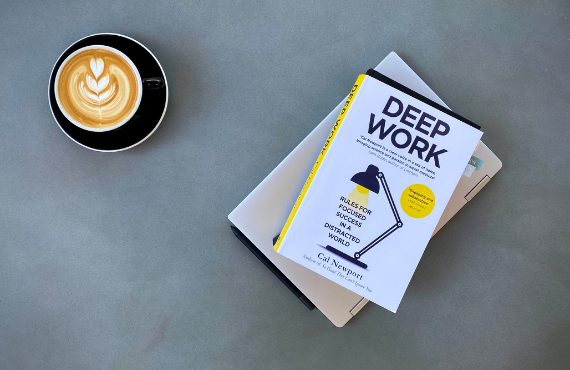Let me run you through how I actioned Cal Newport’s Deep Work: Rules for Focused Success in a Distracted World in the scenario he described as a “dumpster fire”: working at home with young kids.
Overview:
Deep Work has become a go-to for anyone seeking to achieve greater focus in their work. Author Cal Newport guides us through four rules of deep work to establish effective practices, minimise distractions, build our ability to sustain longer periods of focus and reduce time spent on shallow work.
My action – plus kids
In Episode 71 of his podcast (from early 2021), Cal responds to a listener question about achieving deep work while working in a small apartment with young kids during lockdown. Cal provides advice in the context of what was hoped to be a short-term arrangement.
“Your goal should not be, ‘How can I operate at my optimum, even though I’m being burned in a dumpster fire?’. The goal is, ‘How do I avoid having all my skin melt off before this dumpster fire gets put out?’.”
But I’m curious about how Cal’s work can help us beyond the short term, to optimise output within the constraints of this scenario. After all, parents like me were working at home with kids before the pandemic and will be long after.
While I’m thankful to have more space than an apartment affords, my two pre-schoolers share my work desk for at least one of my daily deep work sessions. I’ll be putting to action as many points from his book as practical, alongside Cal’s specific advice from his podcast.
Summarising the Rules:
1. Work Deeply
- Decide on your philosophy: Cal describes a range of deep work philosophies, which is basically determined by how much time and flexibility you can dedicate to your deep work.
- Ritualise: Decide on the practicalities of where you’ll work and for how long. The more consistency, the quicker your mind can slip into a deep state.
- Make grand gestures: Sometimes investing significant resources can provide work opportunities that otherwise weren’t available, while ramping up motivation to make the most of them.
- Don’t work alone: While deep focus requires minimal distraction, intentional collaboration can provide new perspectives, accountability and challenge to push your work further.
- Execute like a business: Reflect on what is the highest value activity to prioritise with your deep work time. Tracking your metrics (e.g. hours spent working deeply) can be an effective motivator and enable greater accountability.
- Be Lazy: When work is done, it’s done. Shut down and consciously transition back to the personal sphere.
MY ACTION:
Cal's rhythmic philosophy best describes my scenario, habitually performing deep work at certain times of day. When my kids were younger, I relied more on the journalistic approach: shifting into deep mode at any opportunity. Cal warns "this approach is not for the deep work novice". In my experience, it does get easier with practice.
While the length of a deep session is often beyond my control, I am able to establish consistency in when they start. I'm conscious of working with my chronotype (lark), so while I generally have three work sessions, the morning two are reserved for deep work.
My grand gesture is our virtual nanny. Paying for her to occupy the children provides extra motivation to focus during those times.
I finish each week with a reflection on the next most "wildly important" actions and plan for the week ahead.
2. Embrace Boredom
“Your ability to concentrate is only as strong as your commitment to train it.”
- Taking breaks is not only important to re-energise yourself but may also allow the unconscious mind to work through problems.
- Be intentional about when to take a break from deep focus by scheduling when you’ll check your email, social media, or open a browser.
- Meditate productively: Use a time when you’re occupied physically but not mentally to focus your attention on a single well-defined professional problem.
MY ACTION:
I keep my email client shut and notifications off during my deep work sessions, which definitely helps me focus.
Family time in between deep work sessions gives my brain ample time to break.
I've found showers and brisk walks are great for unlocking inspiration.
3. Quit Social Media
“Keep using this tool only if you concluded that it has substantial positive impacts and that these outweigh the negative impacts.”
- Reflect carefully on your goal for social media and other highly distracting tools.
- Don’t use a platform just because it could hold some possible benefit. Choose your tools like a craftsman, carefully selecting what’s going to deliver the best net outcome.
MY ACTION:
I've chosen LinkedIn as my only social media platform for work purposes.
I ebb and flow with my social media use. The most successful approach I've found is setting a timer to help me be intentional about how long I spend on social media, but it's not yet a consistent habit.
My experience has been that when I limit social media use, my mind is clearer for work, family or leisure activities.
4. Drain the Shallows
“The shallow stuff that can seem so urgent in the moment turned out to be unexpectedly dispensable.”
- Limit your work time: When you have less time available for total work, you are forced to spend a greater proportion of time on the deep work.
- Schedule every minute of your day in time blocks. This isn’t as tedious as it first sounds; a time block can span hours and include multiple discreet tasks. Cal recommends that a deviation from the schedule triggers a reschedule of the remaining time (with an exception for you stumble onto an “important insight”).
“Your goal is not to stick to a given schedule at all costs; it’s instead to maintain, at all times, a thoughtful say in what you’re doing with your time – even if these decisions are reworked again and again as the day unfolds.”
On his podcast, Cal emphasises the importance of time blocking in the deep work + kids scenario. The aim is achieve as much as possible in the shortest time. He recommends adding more contingency time into the blocks to provide flexibility – expect things to take longer.
- Ask your boss for a shallow work budget: have a clear goal for how much time you should spend on shallow work, and track your time to check your progress against it. This is another particularly salient point for the deep work + kids scenario. Cal recommends talking to your leader about reducing unnecessary meetings and shallow work.
- Finish your work by [time]: While it’s tempting squeeze work into every available moment, it just isn’t sustainable. Decide on what’s a reasonable work schedule, and stick to it to give yourself mental rest. Your schedule may involve a split shift, but choose it consciously, including a fixed end time.
- Become hard to reach: Cal suggests adding barriers to people interrupting or emailing you to ensure only the most important matters add to your workload.
MY ACTION:
My work time is already constrained by my other commitments, however my experience supports Cal's contention: as my time available for work has increased, I saw more shallow work creep in.
My time blocks generally range from 1 – 3 hours long, and simply summarise the natural rhythm of my family's day, with a little extra detail for my work sessions. I found the exercise quick and straightforward, however the benefit reduced when my routine was consistent for consecutive days.
I've learnt from experience that working in the evening is least effective for me, and can prolong my sleep. Filling my evenings with more restorative activities helps me be more productive in the mornings.
Conclusion
While I’d still choose a lone office over my shared family desk, I was surprised how well Cal’s rules applied to this context. The necessity of having drastically reduced work time, and need to divide it throughout the day helps me focus on one task at a time, rather than being tempted by shallow work distractions.
Though my earplugs couldn’t drown out all the noise, and there are days with spills, wriggles and ‘big feelings’, the principle of consistency really helps us all. Success started with recognising deep work sessions as a shared responsibility; we learnt and adapted to each other’s needs to create rituals that support us all.
Given there may well be another month before my kids are back in kinder, I’m glad that our experience is much more comfortable than a dumpster-fire. Thanks Cal.

TimeBeings helps fast-growing teams smash their goals sustainably. Data-driven, research-backed, guaranteed.


